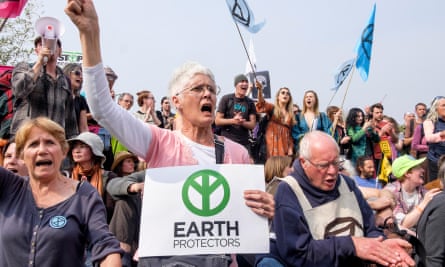Young people are often dubbed “Generation Green” – millennials and teenagers championing climate action and environmental values, often with a well-aimed dig at older generations who have failed to prevent a climate catastrophe.
Yet it is their baby boomer parents and grandparents who are most likely to act in support of green issues, according to a national survey.
About half of people over 55 say they shop locally, buy fewer clothes that last longer and try to avoid single-use plastics. Only about a quarter of those aged 18-34 said they do the same. And only 16% of 18-34s buy seasonal produce, compared with 35% of over-55s.
The Opinium poll asked 2,000 people about their green attitudes. It shows that although a large proportion – 78% – believe they have a personal responsibility to deal with the climate crisis, a substantial number are not prepared to make sacrifices.
While some say they want to eat less meat, avoid fast fashion or cycle instead of drive, few manage to achieve their aims, the survey said.
Last week Boris Johnson outlined several measures to create a “green industrial revolution”, including a ban on selling diesel and petrol cars by 2030. Yet there appears to be little support for further measures. Only 11% backed the idea of a road tax that would charge motorists for the distances they drive, and just 14% would like to see an extra tax on diesel. A cap on how often people fly was supported by 17%.

Chris Venables, head of politics at the Green Alliance, said ministers needed to set out a clearer vision on environmental policy.
“The story of climate change so far is that we’ve done a pretty amazing job and achieved things like a 47% reduction in emissions by doing things where people haven’t really had to change, like reducing coal.
“We’re now at this crunch point where if we want to go further, we need to look at transport and housing and heating. So how do you design policy in a way that people feel that it’s fair and it’s working for them?”
The poll was commissioned by Pure Planet, the renewable energy supplier, as part of the annual People and Power report on attitudes to green issues that it has published for four years.
It shows support for a ban on single-use plastics appears to be dropping: in 2018, 47% supported a ban but that had fallen to 39% this year. Clean air zones around schools also received little support.
Steven Day, a co-founder of Pure Planet, said that many younger people believed they did not have the time or money to act sustainably.
“It’s reassuring to see that when people have more time – perhaps when the kids have grown up, or they are less busy with their careers – then they make more sustainable choices,” he said.
“The will is there. People have told us they want to live more sustainably than they currently are. But clearly the challenge we face is how we harness people’s energy and intent, and channel it on the things that have the most impact.”
A separate study published last week by Climate Outreach showed that there was very little climate denialism left in the UK, but that support for action on climate change could weaken if people felt that they were being ignored.